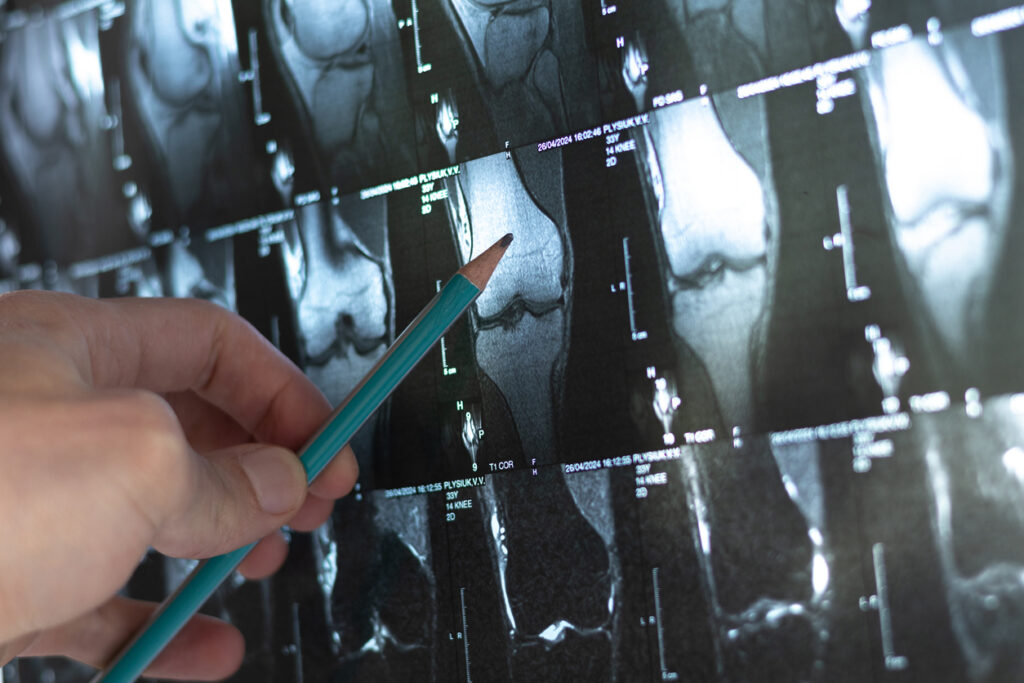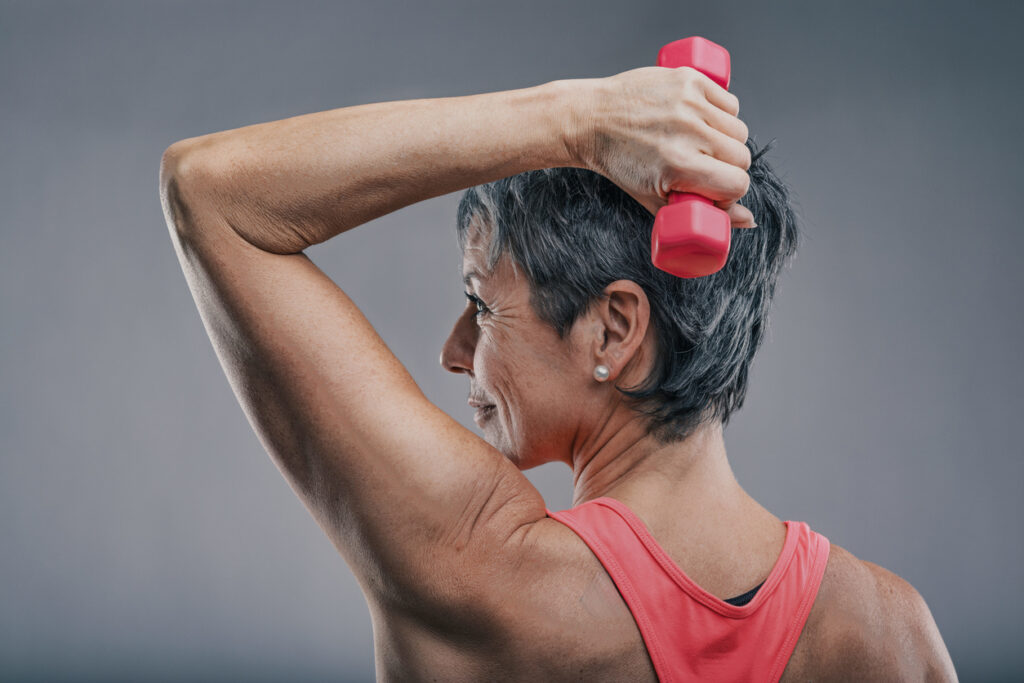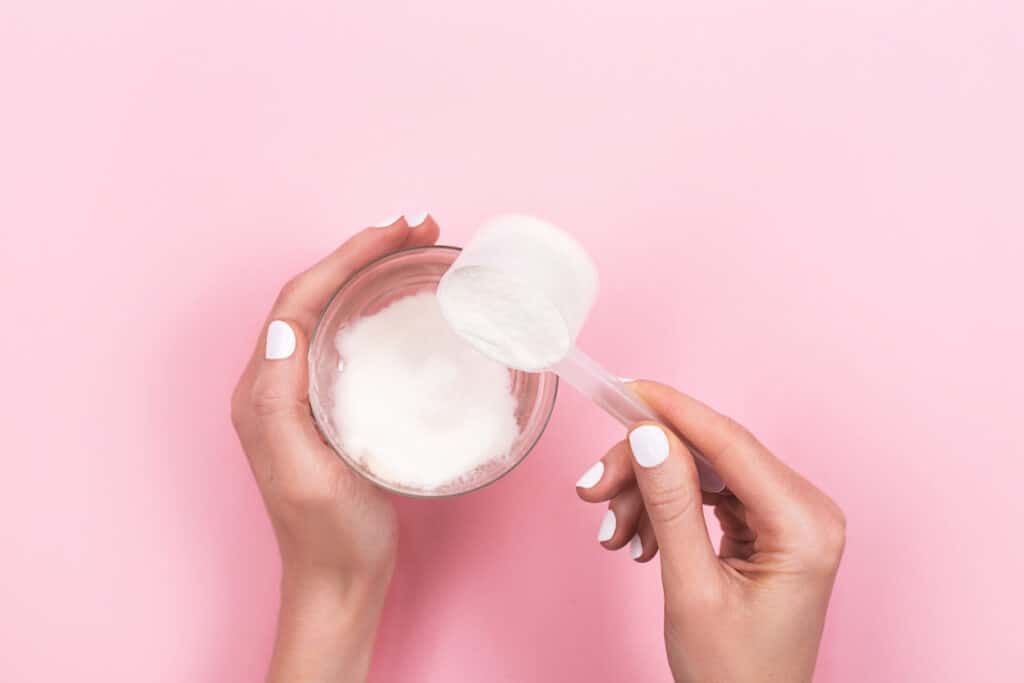Should you take creatine for menopause symptoms? Let’s talk about it.
Creatine is the new big thing, especially for women in menopause. Touted as a miracle for everything from brain fog to bone health, creatine is showing up more frequently in supplements marketed toward women over 40. But does creatine actually work? Is creatine good for menopausal women?
Let’s explore how the scientific research stacks up against the most common claims.
Claim #1: Creatine Improves Bone Density
Verdict: False
Bone health is a major concern during menopause. As estrogen levels drop, bone mineral density (BMD) declines, increasing the risk of osteoporosis. Because of this, many supplements claim to improve bone strength or density — and creatine is no exception.
Some have hypothesized that creatine could help with bone health by improving muscle strength, thereby enhancing mechanical loading on the bones. However, the clinical evidence doesn’t support this theory.
A randomized controlled trial (PMID: 25386713) involving postmenopausal women found that although creatine improved muscle function, it had no significant effect on BMD. Similarly, a comprehensive 2023 meta-analysis (PMID: 37144634) concluded that creatine does not prevent bone loss or osteoporosis.
Compared to nutrients with well-documented effects on bone health — such as calcium, vitamin D, and magnesium — creatine lacks a strong physiological mechanism or clinical evidence for improving BMD in menopausal women.

In summary, while creatine may contribute indirectly to musculoskeletal function, it does not increase bone density and should not replace proven osteoporosis prevention strategies.
Claim #2: Creatine Helps with Cognition
Verdict: Probably False
Many women going through menopause report symptoms like brain fog, memory lapses, and difficulty concentrating. This has led to growing interest in brain-boosting supplements like creatine.
Creatine plays a central role in cellular energy production, including in brain cells. The theory is that declining endogenous creatine levels with age could impair brain function, and supplementation might help replenish those stores.
A 2018 review (PMID: 29704637) looked at creatine’s effects on cognitive performance and found mixed results, with only modest cognitive benefits in very specific situations. For example, some studies used extremely high doses (up to 20g/day) and focused on sleep-deprived or cognitively stressed individuals. These conditions are not representative of the general menopause population.
There is also limited evidence on creatine’s role in improving mood or depression. A 2024 pilot study (PMID: 39488067) found that creatine might enhance the effectiveness of cognitive behavioral therapy (CBT) in people with depression. However, more robust trials are needed to confirm this potential benefit.
Other research has examined creatine’s effects in neurodegenerative diseases, but findings are preliminary and not directly applicable to the average woman experiencing menopause.
In conclusion, creatine is not a proven solution for cognitive decline or depression in menopause, and any potential benefits are likely small and context-specific.
Claim #3: Creatine Helps with Muscle Strength
Verdict: True
One of the most well-documented effects of creatine is its ability to enhance muscle strength and power, especially when combined with resistance training.
Menopause often accelerates sarcopenia, the age-related loss of muscle mass and function. This contributes to a decline in mobility, metabolic rate, and overall quality of life.
Several meta-analyses support creatine as a useful ergogenic aid for older adults:
- A 2021 review (PMID: 34836013) showed that creatine supplementation improved upper-body strength in older adults.
- Another 2024 analysis (PMID: 40292479) reported that creatine, paired with resistance training, led to greater improvements in strength and lean body mass than exercise alone.
Creatine increases intramuscular phosphocreatine stores, which in turn helps produce more ATP during short bursts of high-intensity exercise. This leads to better training performance, greater workload capacity, and faster recovery.

Although creatine doesn’t directly build muscle without training, it does help enhance the benefits of weightlifting, making it an excellent supplement for physically active menopausal women.
Is Creatine Safe for Menopausal Women?
Verdict: Yes
Creatine is one of the most extensively studied sports supplements and has a strong safety profile, including in older populations.
A 2021 position paper by the International Society of Sports Nutrition (PMID: 33800439) concluded that long-term creatine supplementation (3–5g/day) is safe for healthy individuals. Common myths about kidney damage have been disproven repeatedly by clinical trials.
Creatine is generally well-tolerated. Some users may experience mild water retention or bloating early in supplementation, but these effects are temporary. Importantly, creatine does not negatively affect hydration status, liver enzymes, or kidney function in healthy adults.
Women with kidney disease or other chronic conditions should consult their healthcare provider before starting any new supplement, including creatine.
Should You Take Creatine During Menopause?
If you’re wondering whether creatine is worth adding to your supplement routine during menopause, here’s the short answer:
- Don’t take it for bone health or cognitive performance — the evidence just isn’t strong enough.
- Do consider it if you’re doing resistance training and want a safe, effective way to improve strength and recovery.

In this context, creatine is a tool to enhance performance, not a magic pill. But for active women in midlife, it can be part of a comprehensive strategy to maintain muscle, improve workout capacity, and stay strong through menopause and beyond.
How to Use Creatine for Best Results
If you decide to try creatine, here’s how to use it safely and effectively:
- Dosage: 3–5 grams per day of creatine monohydrate (the most researched form)
- Loading: Not necessary. Just start with the daily dose.
- Timing: Anytime of day is fine, though some evidence suggests post-workout may offer slight benefits.
- Hydration: Stay well hydrated, as creatine draws water into muscle cells.
- Consistency: Take it daily to maintain muscle saturation, even on rest days.
Final Thoughts on Creatine for Menopause
Creatine is not a miracle cure for menopause symptoms, but it can be a valuable tool for women focused on strength, mobility, and overall health.
Here’s the bottom line:
- Creatine does not improve bone density or significantly boost cognitive function.
- It may enhance mood when paired with other treatments, but more research is needed.
- It improves muscle strength and performance, especially with resistance training.
- It is safe and well-tolerated in most healthy individuals.
If you’re lifting weights, recovering from workouts, or managing age-related muscle loss, creatine might be worth adding to your routine.
References:
- Candow DG, et al. (2015). Effects of creatine supplementation and resistance training on bone mineral content in postmenopausal women. PMID: 25386713
- Forbes SC, et al. (2023). Creatine and bone health: A systematic review and meta-analysis. PMID: 37144634
- Avgerinos KI, et al. (2018). Effects of creatine supplementation on cognitive function. PMID: 29704637
- Silva S, et al. (2024). Creatine in adjunct with CBT for depression: A pilot study. PMID: 39488067
- Chilibeck PD, et al. (2021). Effect of creatine supplementation during resistance training on muscle mass and strength in older adults. PMID: 34836013
- Candow DG, et al. (2024). Creatine and resistance training in aging: A critical review. PMID: 40292479
- Kreider RB, et al. (2021). International Society of Sports Nutrition position stand: Safety and efficacy of creatine supplementation in exercise, sport, and medicine. PMID: 33800439

